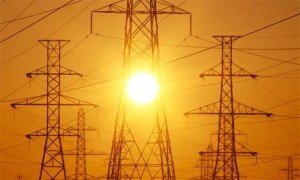by Terence P. Jeffrey • CNSNews.com
 For the first time ever, the average price for a kilowatthour (KWH) of electricity in the United States has broken through the 14-cent mark, climbing to a record 14.3 cents in June, according to data released last week by the Bureau of Labor Statistics.
For the first time ever, the average price for a kilowatthour (KWH) of electricity in the United States has broken through the 14-cent mark, climbing to a record 14.3 cents in June, according to data released last week by the Bureau of Labor Statistics.
Before this June, the highest the average price for a KWH had ever gone was 13.7 cents, the level it hit in June, July, August and September of last year.
The 14.3-cents average price for a KWH recorded this June is about 4.4 percent higher than that previous record.
Typically, the cost of electricity peaks in summer, declines in fall, and hits its lowest point of the year during winter. In each of the first six months of this year, the average price for a KWH hour of electricity has hit a record for that month. In June, it hit the all-time record.
Although the price for an average KWH hit its all-time record in June, the seasonally adjusted electricity price index–which measures changes in the price of electricity relative to a value of 100 and adjusts for seasonal fluctuations in price–hit its all-time high of 209.341 in March of this year, according to BLS. In June, it was slightly below that level, at 209.144.
Back in June 1984, the seasonally adjusted price index for electricity was 103.9—less than half what it was in June 2014.
Electricity prices have not always risen in the United States. The BLS has published an annual electricity price index dating back to 1913. It shows that from that year through 1947, the price of electricity in the United States generally trended down, with the index dropping from 45.5 in 1913 to 26.6 in 1947.
In the two decades after that, electricity prices were relatively stable, with the index still only at 29.9 in 1967—an increase of 12.4 percent over two decades.
However, from 2003 to 2013, the annual electricity price index increased from 139.5 to 200.750, a climb of almost 44 percent.
So far, overall annual electricity production peaked in the United States in 2007. Per capita electricity production also peaked in 2007, based on calculations made using data published by the Energy Information Administration and the Census Bureau.
However, in the first four months of this year (January through April)–according to the July edition of the Monthly Energy Review released yesterday by the Energy Information Administration–overall electricity production was up, with the nation having generated a total of 1,329,042 million KWH. That is more than the 1,281,300 million KWH produced in the first four months of 2013—and it is also more than the 1,298,675 million KWH generated in the first four months of the peak production year of 2007.
According to the Census Bureau, however, the resident population of the United States increased from 300,888,674 in April 2007 to 317,787,997 in April 2014. So, per capita electricity production in the first four months of 2014 (0.004182 million KWH per person) was less than the per capita electricity production in the first four months of 2007 (0.004316 million KWH per person).
The composition of U.S. electricity production in January-April 2014 was also somewhat different from the composition of production in January-April 2007. In both years, coal was the top source of electricity. But in the first four months of 2007, coal generated 644,052 million KWH, while in the first four months of 2014 it generated only 548,297 million KWH. That is a drop of 95,755 million KWH or about 14.9 percent.
Electricity production from nuclear power declined from 260,838 million KWH in January-April 2007 to 254,485 in January-April 2014. Electricity production from conventional hydroelectric power declined from 92,873 million KWH to 88,364. And production from petroleum declined from 24,974 million KWH to 14,931.
The largest increase in electricity production came from natural gas—which climbed from generating 234,331 million KWH in the first four months of 2007 to generating 318,958 million KWH in the first four months of 2014.
The 84,627 in additional million KWH of electricity that natural gas generated in the first four months of this year compared to the first four months of 2007 is more than all of the 68,516 million KWH of electricity generated by wind power in the first four months of this year.
The 68,516 million KWH of electricity generated by wind in January through April equaled 5.2 percent of the nation’s electricity supply during that period.
The 4,594 million KWH of electricity generated by solar power equaled 0.35 percent of the nation’s electricity supply in the first four months of the year.
. . . . . . . . . . . . . . . .
Terence P. Jeffrey is editor in chief of CNSNews.com.
